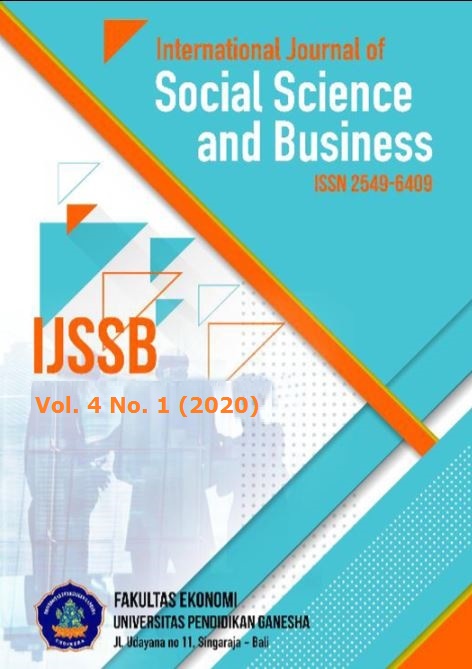Role of Religiosity Support in Generating Employee’s Positive Work Behaviour
DOI:
https://doi.org/10.23887/ijssb.v4i1.22942Keywords:
Individual Religiosity, Religiosity Support, Organizational Commitment, Social Exchange TheoryAbstract
Abstract
The purpose of this research is to examine the impact of individual religiosity as well as religiosity support on employee’s organizational commitment. This research is located in two Syariah Banking in Malang, East Java. A quantitative approach was undertaken in this research. The hypotheses were developed heavily based on Social Exchange Theory. The main finding of this research provides support to the theory, that is religiosity support (as a form of positive behaviour, managed by the organizations) has a significant impact in increasing employees’ organizational commitment
References
Afrianty, T. W. (2013). Work Life Balance Policies in the Indonesian Context. (November), 267. Retrieved from http://espace.library.curtin.edu.au/R?func=dbin-jump-full&local_base=gen01-era02&object_id=199554
Afrianty, T.W., Issa, T., & Burgess, J. (2016). Work-based religiosity support in Indonesia.
In S Gröschl, R Bendl (eds) Managing religious diversity in the workplace: Examples from around the world. Ashgate Publishing, Ltd
Azizah, Siti Nur. (2016). Religiosity Dimensions and the Effect on Organizational Citizenship Behavior Islamic Perspective. The International Conference of Management Sciences (ICoMS). 236- 247.
Baron, R. M., & Kenny, D. A. (1986). The moderator-mediator variable distinction
in social psychological research: conceptual, strategic, and statistical
consideration. Journal of personality and social psychology, 51(61) pp.
-1182
Blau, P. (1964). Exchange and power in social life. New York: Wiley
Cohen, A. (2007). Commitment before and after: An evaluation and reconceptualization of organizational
commitment. Human Resource Management Review, 17, 336-354.
Cropanzano, R., & Mitchell, M. S. (2005). Social
Exchange Theory: An Interdisciplinary Review. Journal of Management, 31(6), pp. 874-900.
Darto, Mariman., Setyadi, Djoko., Riadi, Sukisno S., & Hariyadi, Sugeng. (2015). The Effect
of Transformational Leadership, Religiosity, Job Satisfaction, and Organizational Culture on Organizational Citizenship Behavior and Employee Performance in The Regional Offices of National Institute of Public Administration, Indonesia. European Journal of Business and Management. 7(23): 205- 219. ISSN 2222- 2839
Glock, Charles Y. and Rodney Stark. 1965. Religion and Society in Tension. Chicago: Rand McNally.
Gouldner, A. W. (1960). The Norm of Reciprocity: A Preliminary Statement.
American Sociological Review, 25(2), 161-178.
Kucukcan, Talip. (2000).Can Religiosity be Measured: Dimensions of Religious Commitment. Theories
Revisited. 9(9): 1-5.
Mahudin, N., Noor, N., Dzulkifli, M., & Janon, N. (2016). Religiosity among Muslims: A Scale Development and Validation Study. Hubs-Asia, 20(2), 109. https://doi.org/10.7454/mssh.v20i2.480
Meyer, J. P., & Allen, N. J. (1984). Testing the "Side-Bet Theory" of organizational commitment: Some
methodological considerations. Journal of Applied Psychology,69(3), 372-378.
Meyer, J. P., & Allen, N. J. (1991). A three-component conceptualization of
organizational commitment. Human Resource Management Review, 1(1), 61-89.
Meyer, J. P., Allen, N. J., & Smith, C. A. (1993). Commitment to organizations and
occupations: Extension and test of a three-component conceptualization.
Journal of Applied Psychology, 78(4), 538-551.











